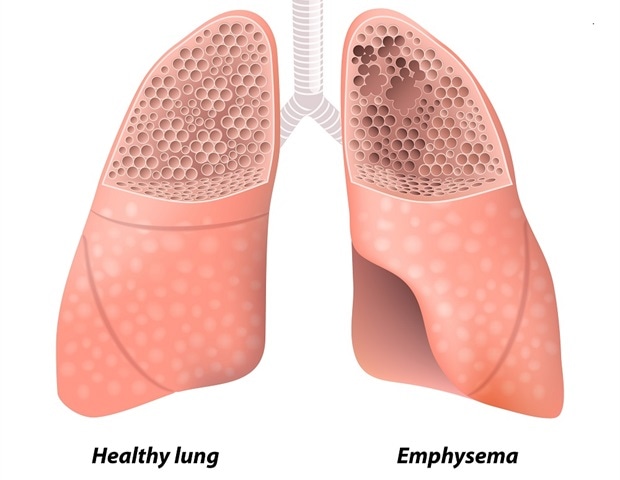Health
Emphysema on CT Scans Linked to Increased Mortality Risks

A new study published in *Radiology* indicates that emphysema detected through low-dose chest computed tomography (LDCT) in a cohort of over 9,000 asymptomatic adults is associated with increased mortality from all causes, as well as chronic obstructive pulmonary disease (COPD) and cardiovascular disease. This research, part of the International Early Lung Cancer Action Program (I-ELCAP), provides significant insights into the long-term health implications of emphysema.
The study involved 9,047 participants, aged between 40 and 85, who underwent baseline LDCT scans in New York between 2000 and 2008. Participants were followed for up to 25 years, with a median follow-up of 23.3 years. The findings suggest that emphysema is not merely incidental but a serious condition requiring attention.
Claudia I. Henschke, a leading radiologist at the Icahn School of Medicine at Mount Sinai, highlighted the importance of the study’s comprehensive analysis. “Our study stands out for its long follow-up and comprehensive analysis of the causes of death in a large lung cancer screening cohort,” she stated.
Among the participants, 70.9% showed no signs of emphysema, while 21.1% had mild, 5.7% moderate, and 2.4% severe emphysema. Notably, nearly 80% of those identified with emphysema had not been previously diagnosed, which included 5% of individuals with moderate or severe forms of the disease.
The mortality analysis revealed that by December 31, 2024, 3,738 participants (41.3%) had died, with the most frequent causes being cardiovascular disease (12.7%) and COPD (3.3%). The median age at death from all causes was 81 years.
Statistical evaluations demonstrated that emphysema is linked to an increased risk of death, particularly from COPD. The risk of mortality from all causes increased with the severity of emphysema, with a 1.15-fold increase for mild cases and a 2.28-fold increase for severe cases. For deaths attributed to COPD, the risk escalated from 2.07-fold for mild emphysema to an alarming 12.06-fold for severe cases.
Dr. Henschke emphasized the implications of these findings, stating, “Clinically, these findings suggest emphysema is not merely an incidental CT finding but a distinct disease entity associated with worse outcomes and increased mortality.” She advocates for a more integrative approach to lung cancer screening, suggesting that it should also assess risks for COPD and cardiovascular disease.
The study’s results could lead healthcare providers to adopt a more nuanced, risk-based treatment strategy aimed at preventing disease progression. Dr. Henschke envisions a future where comprehensive lung cancer screening programs not only identify lung cancer but also evaluate risks for other serious conditions.
In the United States, the current guidelines from the United States Preventive Services Task Force recommend annual lung cancer screening with LDCT for adults aged 50 to 80 who have a 20 pack-year smoking history. Dr. Henschke argues for extending these benefits to non-smokers, noting that approximately 30,000 to 40,000 deaths each year from lung cancer occur among individuals who never smoked.
As this research unfolds, it underscores the critical need for collaboration among pulmonologists, cardiologists, and radiologists to provide holistic care for patients at risk. The findings reflect a shift towards preventive health strategies that leverage imaging technology to predict long-term health outcomes effectively.
-

 Entertainment2 months ago
Entertainment2 months agoAnn Ming Reflects on ITV’s ‘I Fought the Law’ Drama
-

 Entertainment3 months ago
Entertainment3 months agoKate Garraway Sells £2 Million Home Amid Financial Struggles
-

 Health2 months ago
Health2 months agoKatie Price Faces New Health Concerns After Cancer Symptoms Resurface
-

 Entertainment2 months ago
Entertainment2 months agoCoronation Street’s Carl Webster Faces Trouble with New Affairs
-

 Entertainment2 months ago
Entertainment2 months agoWhere is Tinder Swindler Simon Leviev? Latest Updates Revealed
-

 Entertainment3 months ago
Entertainment3 months agoKim Cattrall Posts Cryptic Message After HBO’s Sequel Cancellation
-

 Science3 weeks ago
Science3 weeks agoBrian Cox Addresses Claims of Alien Probe in 3I/ATLAS Discovery
-

 Entertainment2 months ago
Entertainment2 months agoOlivia Attwood Opens Up About Fallout with Former Best Friend
-

 Entertainment3 months ago
Entertainment3 months agoMarkiplier Addresses AI Controversy During Livestream Response
-

 Entertainment3 months ago
Entertainment3 months agoMasterChef Faces Turmoil as Tom Kerridge Withdraws from Hosting Role
-

 Entertainment4 months ago
Entertainment4 months agoSpeculation Surrounds Home and Away as Cast Departures Mount
-

 World2 months ago
World2 months agoCole Palmer’s Mysterious Message to Kobbie Mainoo Sparks Speculation





















